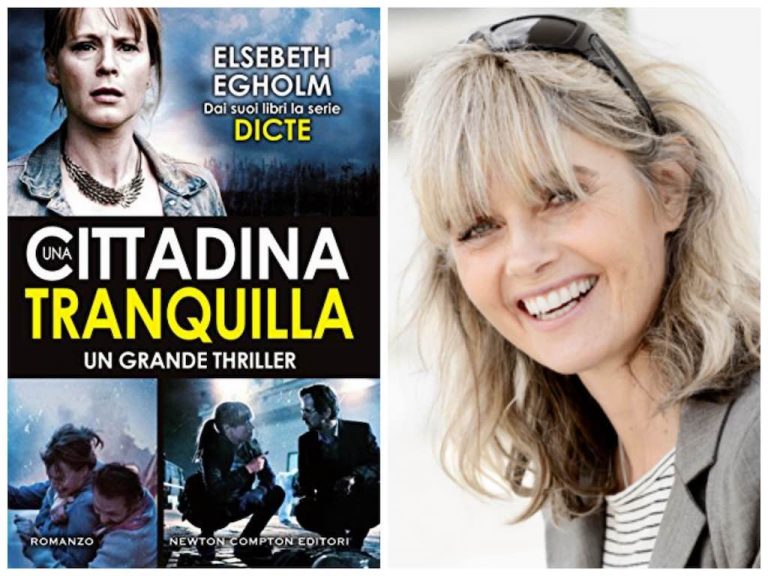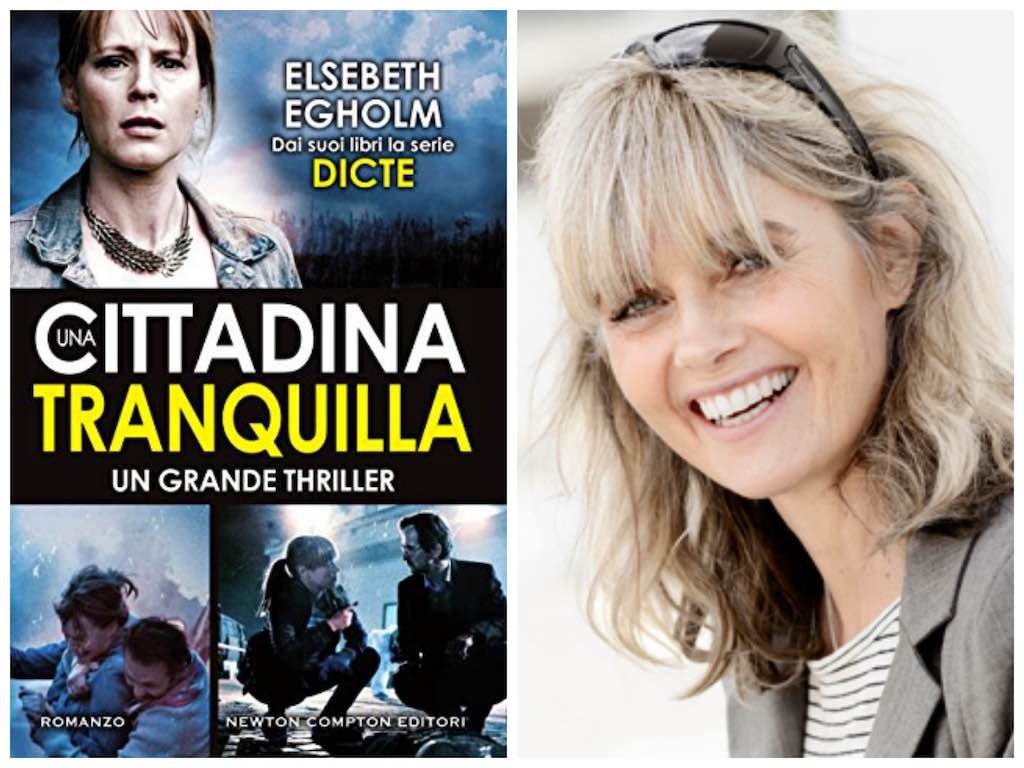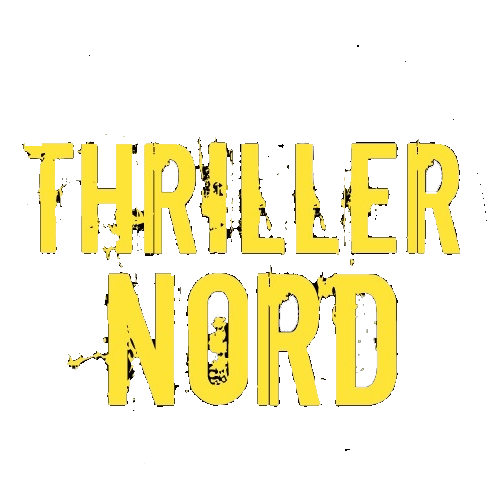A tu per tu con l’autore
A tu per tu con Elsebeth Egholm, autrice dei romanzi che hanno dato vita alla fortunata serie tv Dicte: ambientata in una cittadina della Danimarca, ci racconta le vicende di una giornalista di cronaca nera, (che da il nome alla serie). Leggete con noi cosa ci ha raccontato…
Il romanzo affronta anche il tema del razzismo in maniera poco evidente ma profonda. Secondo lei esistono ancora oggi pregiudizi tanto radicati,nei confronti di etnie diverse, da far temere a giornalisti e forze dell’ordine la fuga di notizie relative a certi tipi di casi così gravi?
Credo che in ognuno di noi ci sia, se non proprio razzismo, almeno una forma di pregiudizio. Questo è quello che sto cercando di far capire: siamo propensi a vedere negli altri degli atteggiamenti razzisti o di pregiudizio, quando poi possiamo ritrovarli anche in noi stessi in tanti piccoli dettagli. A volte il pregiudizio è semplicemente un’aspettativa, dovuta ad un’ esperienza personale o al modo di guardare il mondo. Nel caso della donna che ha abbandonato il suo bambino, in una cesta con una pagina del corano (nell’ultimo romanzo “Era una cittadina tranquilla”, viene ritrovata una cesta con il corpo privo di vita di un neonato e una pagina del corano), molti penserebbero “il bambino è stato fatto morire da una giovane ragazza musulmana che non lo voleva”. In tutti i casi si penserebbe (io lo farei) ad una giovane madre immatura. Nel mio piccolo sto cercando di scuotere le coscienze, cercando di mostrare che tutti noi abbiamo dei preoncetti e commettiamo errori – sia nel bene che nel male. Sarebbe giusto tenerlo a mente quando ci troviamo a giudicare le azioni degli altri.
In a tiny but deeply way, your novel deals with racism.
In your opinion, are still existing today deep-rooted biases towards different ethnics, so to raise journalists and law enforcement concerns about leak, referred to so serious kinds of cases?
I think there is, if not racism, then prejudice in all of us. This is what I am trying to paint a picture of: We tend to think of others as racistic and/or prejudice – when in fact we find it in ourselves in so many little ways. After all prejudism is sometimes only what you expect, because your experience tells you so or because it fits with your understanding of the world: In the case of the woman who has abandoned her baby and there is a page of the Koran found in the basket, most people would probably think: the baby was left to die by a young muslim girl with an unwanted pregnancy. In any case, you would think (I would): a young and immature mother. I suppose I am trying in a small way to shake us up and to show that we all assume things all the time – sometimes rightly so, but sometimes wrongly. And it’s good to keep that in mind when we judge others for their actions.

I due crimini da lei affrontati nel romanzo sono principalmente l’abbandono e il rapimento. Quale ritiene essere il più grave? Lei non esprime mai un vero e proprio giudizio di condanna, ma cerca piuttosto di portare il lettore a comprendere i gesti che hanno poi portato al crimine. Ritiene che anche per crimini gravi come l’omicidio, non si debba emettere un giudizio se prima non si hanno chiari i motivi di tale gesto?
Non credo sia possibile stabilire quale tra i due crimini, l’abbandono e l’omicidio, sia il peggiore. Dipende dalle motivazioni e dalle storie di ogni individuo. E’ vero, io cerco di non giudicare, gioco a carte scoperte con il lettore, così che possa trarre da solo le proprie conclusioni. A volte, indagando dietro la scena di un crimine, ricostruendo il susseguirsi degli eventi che lo hanno provocato, capita che non si riesca ad attribuire una colpa, perché in effetti il colpevole non avrebbe potuto agire diversamente. Con ciò non voglio dire che le persone non debbano essere perseguite legalmente, la legge non è infallibile, ma è l’unico strumento che abbiamo per ripristinare il bene, laddove è stato fatto del male. Ovviamente un omicidio deve essere punito, altrimenti si vivrebbe nel caos, ma non per questo disprezzo chi si è macchiato di tale crimine, e fortunatamente, la legge prevede differenza tra omicidio e omicidio colposo.
The two crimes you mainly deal with in your novel are abandonment and kidnapping.
Which one do you think the worst? You never express a real “sentence”, but you try to make Reader to understand the acts, the situations that led to crime. Do you think that, for serious crimes such as murder too, judgment must be reserved until the reasons to such action become clear?
I don’t think it’s possible really to say which crime would be the worst: abandonment or kidnapping. It all depends on the individual motive and story. Yes it’s true that I try not to judge. I try to lay the cards on the table for the reader to draw her/his own conclusions. Sometimes there is no guilty party when you look behind the scenes of the crime and see all the turns of events that led to the crime and you see that the perpetrator was not able to act differently. However that doesn’t mean the person should not be sentenced by law. The law is a fallible instrument, but it’s all we’ve got to try to sort right from wrong. I do believe murder should be punished, otherwise chaos would reign. But that’s not to say I despise every one who took a life. And, thankfully, there is a difference between murder and manslaughter in the law.
Nel libro viene dato molto risalto alla comprensione della natura umana.
Quanto è importante questo tipo di comprensione nel lavoro di scrittrice? Questa sua conoscenza le risulta più utile quando scrive un articolo di giornale oppure quando scrive un romanzo?
Per me, la comprensione della natura umana è sempre stata un dovere e una sfida, suppongo che sia dovuto anche alla mia grande curiosità nel cercare di rispondere ad alcune domande: perché le persone fanno quello che fanno? Come si comportano quando sono sotto pressione? Evito sempre di giudicare e non perché io sia perfetta, ma perché conosco il pericolo di un giudizio. Credo che questa conoscenza mi sia stata utile sia come giornalista che come scrittrice, per comprendere a fondo le persone (sebbene a volte sia quasi impossibile farlo)
In your novel you focused about comprehension of human nature.
How important is this kind of comprehension for a Writer? Is such knowledge more useful when you write a newspaper article or a novel?
To me trying to understand human nature was always a must and a big challenge. I suppose I am very curious about human nature: why do people do what they do? How do they react under pressure? I try to reserve judgement – I’m not perfect, but I’m aware of the danger in judging people. I think it has served me well both as a journalist and as a writer to try to understand peoples motives. (Although sometimes it proves next to impossible)
I suoi personaggi sono descritti in maniera minuziosa in ogni lato del loro carattere, e hanno particolare risalto i personaggi femminili. Sono totalmente inventati o si è ispirata a qualcuno che conosce nella vita reale?
Il libro è certamente frutto della mia immaginazione, così come i personaggi. Faccio sempre molta attenzione a non descrivere persone che conosco, tuttavia visto che niente viene dal niente, nascoste tra le pagine ci sono dei tratti miei, degli amici e dalla famiglia, ma così mascherati che quasi non ricordo da dove ho preso in prestito quel difetto o quel particolare caratteriale. Dicte è decisamente ispirata a me, anche se io non ho nemmeno la metà del suo coraggio, e non sono mai stata una testimone di Geova. Lei vive nella mia vecchia casa, è una giornalista come lo ero i0, ed ha il mio cane!
You describe thoroughly your characters, into every aspect of their nature and female characters have particular attention. Are they totally made up or inspired by someone you know in real life?
The book, of course, is a work of fiction and so are the characters. I’m always very careful not to describe people I know, but nothing comes from nothing, and of course there will be parts of myself and friends and family hidden between the pages. So much so that I have lost track of where I borrowed which flaw or character trait from. Dicte is definitely partly me – but I’m not half as courageous as she is, and I was never a Jehovas Whitness! She lives in my old house, she is a journalist like I was, and she has my dog!
Nel libro, regna un grande senso di imparzialità nei confronti delle azioni di ogni personaggio. Riesce sempre ad essere totalmente imparziale nei confronti dei fatti oppure alcune volte rischia di farsi trascinare dai propri sentimenti? E questa è una deformazione professionale oppure è una scelta narrativa per non condizionare il lettore?
In verità quando scrivo mi faccio sempre coinvolgere dai miei sentimenti, ma allo stesso tempo cerco di contrastarli. Mi dico : perché non ti piace questo personaggio? Come potresti descrivere le sue azioni e le sue motivazioni, in modo tale da poter essere solidale con lui? Quale piccola variante o informazione aggiuntiva potrebbe aiutarti a comprendere perchè ha agito in un certo modo?
The principle of impartiality towards actions of every characters reigns in your novel.
Can you always be unbiased towards events or sometimes do you risk to get caught up from your feelings? Is this a professional habit or a narrative choice not to influence Reader?
I definitely get caught up in my own feelings when I write. But at the same time I try to challenge these feelings. I say to myself: Why do you not like this character? How could you describe his actions and his motivation so that you start feeling sympathetic towards him? What little twist or piece of information would make you understand why he did it?
Lei ha iniziato i suoi studi partendo dalla musica, c’è stato un evento particolare che l’ha fatta innamorare del giornalismo e della scrittura?
Da quando ho imparato a leggere, ho sempre sognato di scrivere storie. Credo che la grande svolta sia avvenuta nel 1985, quando ho deciso di abbandonare il Conservatorio per studiare giornalismo. Non riuscivo ad immaginarmi con una carriera nel mondo della musica, a insegnare pianoforte. Da quel momento ho iniziato a vedermi sempre di più come uno scrittrice.
You began your studies starting from music. There has been a particular event as a result of which you fell in love with journalism and writing?
Ever since I learned to read, I have always wanted to write stories. I suppose the big turn came when I left the Conservatory of Music in 1985 to study journalism. I could not see myself in music, teaching piano. I started more and more to see myself as a writer from then on.
I suoi libri hanno ispirato una serie tv di grande successo, Dicte. Ci racconta come è nato questo progetto? Avrebbe mai pensato ad una trasposizione del genere quando ha iniziato a scrivere?
Il progetto della serie tv, è nato quando una compagnia di produzione, la Miso Film, chiese al mio agente Lars Ringhof, se avesse uno scrittore interessato a collaborare con uno sceneggiatore, per scrivere una nuova serie gialla danese, da mandare in onda in prima serata. Il progetto si sviluppò poi in “Those who kill”. In seguito la Miso Film si è interessata anche ai miei libri su Dicte. Tutta la faccenda ha richiesto qualche anno, ma nel 2013 finalmente siamo riusciti a vedere la prima stagione di Dicte.
Your books inspired Dicte, a very successful tv series. Can you tell us how was born this project? Did you ever think about such a tv transposition when you began to write?
The tv-series of Dicte came about when a production company, Miso Film, asked my agent, Lars Ringhof, if he had a writer who could team up with a script writer to write ‘New Danish Crime’ for prime time television. This project evolved to the tv-series ‘Those who kill’. And after that Miso Film got interested in my books about Dicte. The whole process took some years, but in 2013 we could finally watch the first season of Dicte.
Parlando di gusti letterari, non le chiederemo se conosce il thrillernordico come facciamo di solito, ma segue un autore in particolare? E nel panorama internazionale, come si orientano le sue letture?
Ho una grande ammirazione per la scrittrice britannica Kate Atkinson – sia per le sue storie sull’ufficiale dell’esercito in pensione Jackson Brodie, che per gli ultimi romanzi : Vita dopo vita e Un Dio in rovina. Ha un suo particolare stile, giocoso e allo stesso tempo ricco di humor, ed un carattere molto forte. Adoro anche i quattro libri “napoletani” della vostra Elena Ferrante (la quadrilogia de L’amica geniale), leggerli è stata una delle esperienze migliori e più gratificanti della mia vita. Per quel che riguarda i miei libri, spero che i lettori li prendano a cuore e si godano la lettura.
About taste in books, we won’t ask you about nordic thriller, as we usual do, but we would like to ask you if you are interested in an Author in particular. And, internationally,, how are you looking towards your readings?
I have a great fondness of the British author Kate Atkinson – both her crimes stories about retired army officer Jackson Brodie, and the later novels: Life after life and A God in ruins. She has her very own, quite playful style and she is very strong on character. Great humour too! I also love the four Napoli books by your own Elena Ferrante. Reading those books was one of the best and most rewarding experiences of my life. As far as my own books go, I just hope the readers will take them to heart and enjoy the ride.
A cura di Amanda Airola
Traduzione di Sabrina De Bastiani e Manuela Fontenova
Acquista su Amazon.it:

